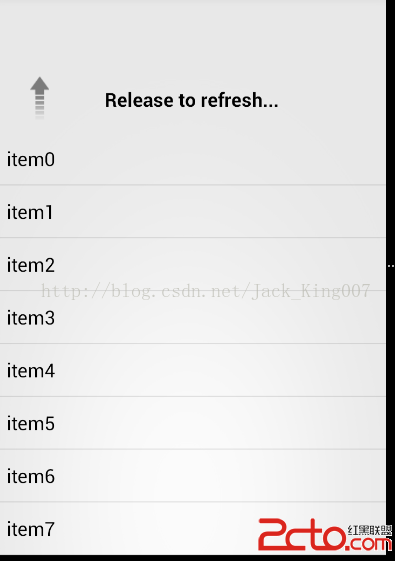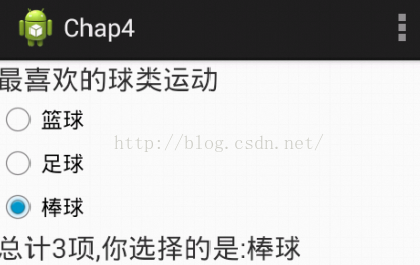編輯:關於Android編程
Otto是一個輕量級的EventBus,它的使用非常簡單,我們使用一個Bus的單例,所有需要產生事件(@Produce bus.post(new YourEvent(…)))或者處理事件(@Subscribe)的對象,在create時register,銷毀destroy時unregister即可。
@Subscribe
public void reveiverMethod(YourEvent event){
//...TODO
}
@Produce
package com.example.net.mobctrl.ottotest;
import com.squareup.otto.Produce;
import com.squareup.otto.Subscribe;
import android.app.Activity;
import android.os.Bundle;
import android.view.View;
import android.view.View.OnClickListener;
import android.widget.TextView;
public class MainActivity extends Activity {
TextView tvShow;
@Override
protected void onCreate(Bundle savedInstanceState) {
super.onCreate(savedInstanceState);
BusManager.getInstance().register(this);
System.out.println(debug:onCreate);
setContentView(R.layout.activity_main);
findViewById(R.id.btn_1).setOnClickListener(new OnClickListener() {
@Override
public void onClick(View arg0) {
BusManager.getInstance().post(new MyEvent(將我點擊的內容,發送出去));
}
});
tvShow = (TextView) findViewById(R.id.tv_show);
}
@Override
protected void onDestroy() {
super.onDestroy();
BusManager.getInstance().unregister(this);
}
@Subscribe
public void receiveEventByParam(MyEvent event) {
System.out.println(debug: + event.getContent());
if (tvShow != null) {
tvShow.setText(event.getContent());
}
}
@Produce
public MyEvent sendEvent() {
return new MyEvent(這是我產生的事件(@Produce));
}
}
BusManager 是一個單例
package com.example.net.mobctrl.ottotest;
import com.squareup.otto.Bus;
public class BusManager {
private static Bus bus = null;
private BusManager() {
}
public static synchronized Bus getInstance() {
if (bus == null) {
bus = new Bus();
}
return bus;
}
}
MyEvent 自己定義的事件類
package com.example.net.mobctrl.ottotest;
public class MyEvent {
private String content;
public String getContent() {
return content;
}
public void setContent(String content) {
this.content = content;
}
public MyEvent(){
}
public MyEvent(String content) {
super();
this.content = content;
}
}
05-20 20:41:59.923: I/System.out(30320): debug:這是我產生的事件(@Produce)
05-20 20:41:59.923: I/System.out(30320): debug:onCreate
05-20 20:42:11.553: I/System.out(30320): debug:將我點擊的內容,發送出去
每次調用registe()方法是,會立即調用@Produce方法,將return的事件發送出去,由參數為MyEvent的@Subscribe方法接收並處理。bus.post()也是如此。
主要是Bus.java裡面的代碼:
關鍵的方法有
public void register(Object object)
該方法的作用是查找object裡面所有帶有Produce和Subscribe注解的方法,並保存在Map中,並且會立即執行Produce注解的方法。
public void post(Object event)
發送事件event,根據之前注冊過的object裡面的方法,查找參數為event的Subscribe方法,並invoke該方法。這樣就達到了post之後,調用對應Subscribe方法的目的。
public void unregister(Object object)
注銷object,刪除掉map中保存的object的方法,釋放object,防止內存洩露。
具體代碼如下:
package com.squareup.otto;
import java.lang.reflect.InvocationTargetException;
import java.util.Collection;
import java.util.HashMap;
import java.util.HashSet;
import java.util.LinkedList;
import java.util.List;
import java.util.Map;
import java.util.Set;
import java.util.concurrent.ConcurrentHashMap;
import java.util.concurrent.ConcurrentLinkedQueue;
import java.util.concurrent.ConcurrentMap;
import java.util.concurrent.CopyOnWriteArraySet;
/*
* @author Cliff Biffle
* @author Jake Wharton
*/
public class Bus {
public static final String DEFAULT_IDENTIFIER = default;
/** All registered event handlers, indexed by event type. */
private final ConcurrentMap, Set> handlersByType =
new ConcurrentHashMap, Set>();
/** All registered event producers, index by event type. */
private final ConcurrentMap, EventProducer> producersByType =
new ConcurrentHashMap, EventProducer>();
/** Identifier used to differentiate the event bus instance. */
private final String identifier;
/** Thread enforcer for register, unregister, and posting events. */
private final ThreadEnforcer enforcer;
/** Used to find handler methods in register and unregister. */
private final HandlerFinder handlerFinder;
/** Queues of events for the current thread to dispatch. */
private final ThreadLocal> eventsToDispatch =
new ThreadLocal>() {
@Override protected ConcurrentLinkedQueue initialValue() {
return new ConcurrentLinkedQueue();
}
};
/** True if the current thread is currently dispatching an event. */
private final ThreadLocal isDispatching = new ThreadLocal() {
@Override protected Boolean initialValue() {
return false;
}
};
/** Creates a new Bus named default that enforces actions on the main thread. */
public Bus() {
this(DEFAULT_IDENTIFIER);
}
/**
* Creates a new Bus with the given {@code identifier} that enforces actions on the main thread.
*
* @param identifier a brief name for this bus, for debugging purposes. Should be a valid Java identifier.
*/
public Bus(String identifier) {
this(ThreadEnforcer.MAIN, identifier);
}
/**
* Creates a new Bus named default with the given {@code enforcer} for actions.
*
* @param enforcer Thread enforcer for register, unregister, and post actions.
*/
public Bus(ThreadEnforcer enforcer) {
this(enforcer, DEFAULT_IDENTIFIER);
}
/**
* Creates a new Bus with the given {@code enforcer} for actions and the given {@code identifier}.
*
* @param enforcer Thread enforcer for register, unregister, and post actions.
* @param identifier A brief name for this bus, for debugging purposes. Should be a valid Java identifier.
*/
public Bus(ThreadEnforcer enforcer, String identifier) {
this(enforcer, identifier, HandlerFinder.ANNOTATED);
}
/**
* Test constructor which allows replacing the default {@code HandlerFinder}.
*
* @param enforcer Thread enforcer for register, unregister, and post actions.
* @param identifier A brief name for this bus, for debugging purposes. Should be a valid Java identifier.
* @param handlerFinder Used to discover event handlers and producers when registering/unregistering an object.
*/
Bus(ThreadEnforcer enforcer, String identifier, HandlerFinder handlerFinder) {
this.enforcer = enforcer;
this.identifier = identifier;
this.handlerFinder = handlerFinder;
}
@Override public String toString() {
return [Bus + identifier + ];
}
/**
* Registers all handler methods on {@code object} to receive events and producer methods to provide events.
*
* If any subscribers are registering for types which already have a producer they will be called immediately
* with the result of calling that producer.
*
* If any producers are registering for types which already have subscribers, each subscriber will be called with
* the value from the result of calling the producer.
*
* @param object object whose handler methods should be registered.
* @throws NullPointerException if the object is null.
*/
public void register(Object object) {
if (object == null) {
throw new NullPointerException(Object to register must not be null.);
}
enforcer.enforce(this);
Map, EventProducer> foundProducers = handlerFinder.findAllProducers(object);
for (Class type : foundProducers.keySet()) {
final EventProducer producer = foundProducers.get(type);
EventProducer previousProducer = producersByType.putIfAbsent(type, producer);
//checking if the previous producer existed
if (previousProducer != null) {
throw new IllegalArgumentException(Producer method for type + type
+ found on type + producer.target.getClass()
+ , but already registered by type + previousProducer.target.getClass() + .);
}
Set handlers = handlersByType.get(type);
if (handlers != null && !handlers.isEmpty()) {
for (EventHandler handler : handlers) {
dispatchProducerResultToHandler(handler, producer);
}
}
}
Map, Set> foundHandlersMap = handlerFinder.findAllSubscribers(object);
for (Class type : foundHandlersMap.keySet()) {
Set handlers = handlersByType.get(type);
if (handlers == null) {
//concurrent put if absent
Set handlersCreation = new CopyOnWriteArraySet();
handlers = handlersByType.putIfAbsent(type, handlersCreation);
if (handlers == null) {
handlers = handlersCreation;
}
}
final Set foundHandlers = foundHandlersMap.get(type);
if (!handlers.addAll(foundHandlers)) {
throw new IllegalArgumentException(Object already registered.);
}
}
for (Map.Entry, Set> entry : foundHandlersMap.entrySet()) {
Class type = entry.getKey();
EventProducer producer = producersByType.get(type);
if (producer != null && producer.isValid()) {
Set foundHandlers = entry.getValue();
for (EventHandler foundHandler : foundHandlers) {
if (!producer.isValid()) {
break;
}
if (foundHandler.isValid()) {
dispatchProducerResultToHandler(foundHandler, producer);
}
}
}
}
}
private void dispatchProducerResultToHandler(EventHandler handler, EventProducer producer) {
Object event = null;
try {
event = producer.produceEvent();
} catch (InvocationTargetException e) {
throwRuntimeException(Producer + producer + threw an exception., e);
}
if (event == null) {
return;
}
dispatch(event, handler);
}
/**
* Unregisters all producer and handler methods on a registered {@code object}.
*
* @param object object whose producer and handler methods should be unregistered.
* @throws IllegalArgumentException if the object was not previously registered.
* @throws NullPointerException if the object is null.
*/
public void unregister(Object object) {
if (object == null) {
throw new NullPointerException(Object to unregister must not be null.);
}
enforcer.enforce(this);
Map, EventProducer> producersInListener = handlerFinder.findAllProducers(object);
for (Map.Entry, EventProducer> entry : producersInListener.entrySet()) {
final Class key = entry.getKey();
EventProducer producer = getProducerForEventType(key);
EventProducer value = entry.getValue();
if (value == null || !value.equals(producer)) {
throw new IllegalArgumentException(
Missing event producer for an annotated method. Is + object.getClass()
+ registered?);
}
producersByType.remove(key).invalidate();
}
Map, Set> handlersInListener = handlerFinder.findAllSubscribers(object);
for (Map.Entry, Set> entry : handlersInListener.entrySet()) {
Set currentHandlers = getHandlersForEventType(entry.getKey());
Collection eventMethodsInListener = entry.getValue();
if (currentHandlers == null || !currentHandlers.containsAll(eventMethodsInListener)) {
throw new IllegalArgumentException(
Missing event handler for an annotated method. Is + object.getClass()
+ registered?);
}
for (EventHandler handler : currentHandlers) {
if (eventMethodsInListener.contains(handler)) {
handler.invalidate();
}
}
currentHandlers.removeAll(eventMethodsInListener);
}
}
/**
* Posts an event to all registered handlers. This method will return successfully after the event has been posted to
* all handlers, and regardless of any exceptions thrown by handlers.
*
*
If no handlers have been subscribed for {@code event}'s class, and {@code event} is not already a * {@link DeadEvent}, it will be wrapped in a DeadEvent and reposted. * * @param event event to post. * @throws NullPointerException if the event is null. */ public void post(Object event) { if (event == null) { throw new NullPointerException(Event to post must not be null.); } enforcer.enforce(this); Set
當你自己寫框架的時候,很多時候需要用到Annotation查找,
package com.squareup.otto;
import java.lang.reflect.Method;
import java.lang.reflect.Modifier;
import java.util.HashMap;
import java.util.HashSet;
import java.util.Map;
import java.util.Set;
/**
* Helper methods for finding methods annotated with {@link Produce} and {@link Subscribe}.
*
* @author Cliff Biffle
* @author Louis Wasserman
* @author Jake Wharton
*/
final class AnnotatedHandlerFinder {
/** Cache event bus producer methods for each class. */
private static final Map, Map, Method>> PRODUCERS_CACHE =
new HashMap, Map, Method>>();
/** Cache event bus subscriber methods for each class. */
private static final Map, Map, Set>> SUBSCRIBERS_CACHE =
new HashMap, Map, Set>>();
/**
* Load all methods annotated with {@link Produce} or {@link Subscribe} into their respective caches for the
* specified class.
*/
private static void loadAnnotatedMethods(Class listenerClass) {
Map, Set> subscriberMethods = new HashMap, Set>();
Map, Method> producerMethods = new HashMap, Method>();
for (Method method : listenerClass.getDeclaredMethods()) {
// The compiler sometimes creates synthetic bridge methods as part of the
// type erasure process. As of JDK8 these methods now include the same
// annotations as the original declarations. They should be ignored for
// subscribe/produce.
if (method.isBridge()) {
continue;
}
if (method.isAnnotationPresent(Subscribe.class)) {
Class[] parameterTypes = method.getParameterTypes();
if (parameterTypes.length != 1) {
throw new IllegalArgumentException(Method + method + has @Subscribe annotation but requires
+ parameterTypes.length + arguments. Methods must require a single argument.);
}
Class eventType = parameterTypes[0];
if (eventType.isInterface()) {
throw new IllegalArgumentException(Method + method + has @Subscribe annotation on + eventType
+ which is an interface. Subscription must be on a concrete class type.);
}
if ((method.getModifiers() & Modifier.PUBLIC) == 0) {
throw new IllegalArgumentException(Method + method + has @Subscribe annotation on + eventType
+ but is not 'public'.);
}
Set methods = subscriberMethods.get(eventType);
if (methods == null) {
methods = new HashSet();
subscriberMethods.put(eventType, methods);
}
methods.add(method);
} else if (method.isAnnotationPresent(Produce.class)) {
Class[] parameterTypes = method.getParameterTypes();
if (parameterTypes.length != 0) {
throw new IllegalArgumentException(Method + method + has @Produce annotation but requires
+ parameterTypes.length + arguments. Methods must require zero arguments.);
}
if (method.getReturnType() == Void.class) {
throw new IllegalArgumentException(Method + method
+ has a return type of void. Must declare a non-void type.);
}
Class eventType = method.getReturnType();
if (eventType.isInterface()) {
throw new IllegalArgumentException(Method + method + has @Produce annotation on + eventType
+ which is an interface. Producers must return a concrete class type.);
}
if (eventType.equals(Void.TYPE)) {
throw new IllegalArgumentException(Method + method + has @Produce annotation but has no return type.);
}
if ((method.getModifiers() & Modifier.PUBLIC) == 0) {
throw new IllegalArgumentException(Method + method + has @Produce annotation on + eventType
+ but is not 'public'.);
}
if (producerMethods.containsKey(eventType)) {
throw new IllegalArgumentException(Producer for type + eventType + has already been registered.);
}
producerMethods.put(eventType, method);
}
}
PRODUCERS_CACHE.put(listenerClass, producerMethods);
SUBSCRIBERS_CACHE.put(listenerClass, subscriberMethods);
}
/** This implementation finds all methods marked with a {@link Produce} annotation. */
static Map, EventProducer> findAllProducers(Object listener) {
final Class listenerClass = listener.getClass();
Map, EventProducer> handlersInMethod = new HashMap, EventProducer>();
if (!PRODUCERS_CACHE.containsKey(listenerClass)) {
loadAnnotatedMethods(listenerClass);
}
Map, Method> methods = PRODUCERS_CACHE.get(listenerClass);
if (!methods.isEmpty()) {
for (Map.Entry, Method> e : methods.entrySet()) {
EventProducer producer = new EventProducer(listener, e.getValue());
handlersInMethod.put(e.getKey(), producer);
}
}
return handlersInMethod;
}
/** This implementation finds all methods marked with a {@link Subscribe} annotation. */
static Map, Set> findAllSubscribers(Object listener) {
Class listenerClass = listener.getClass();
Map, Set> handlersInMethod = new HashMap, Set>();
if (!SUBSCRIBERS_CACHE.containsKey(listenerClass)) {
loadAnnotatedMethods(listenerClass);
}
Map, Set> methods = SUBSCRIBERS_CACHE.get(listenerClass);
if (!methods.isEmpty()) {
for (Map.Entry, Set> e : methods.entrySet()) {
Set handlers = new HashSet();
for (Method m : e.getValue()) {
handlers.add(new EventHandler(listener, m));
}
handlersInMethod.put(e.getKey(), handlers);
}
}
return handlersInMethod;
}
private AnnotatedHandlerFinder() {
// No instances.
}
}
 Android仿Win8界面開發
Android仿Win8界面開發
本文將要模仿Win8界面的一個設計,一個一個的方塊。方法很簡單。這裡自己把圖片改改就可以成為自己想要的界面了。1、首先來看看自定義的MyImageView:package
 安卓 (1)教你怎麼使用下拉刷新
安卓 (1)教你怎麼使用下拉刷新
很久沒用開源項目,重新復習一下下拉刷新 也是想總結下一個項目,應該需要那些東西, 為自己打下基礎, 你也可以自己去下 library,關於源碼我會在後面放在 效果圖 p
 跟我學Android之五
跟我學Android之五
本章目標 掌握單選按鈕的用法 掌握復選框的用法 掌握開關按鈕的用法 掌握圖像視圖的用法。 掌握自動完成文本框的用法。單選控件——RadioButt
 React-Native 與 Android 集成 (三、原理與總結)
React-Native 與 Android 集成 (三、原理與總結)
ReactNative 讓開發者使用 JavaScript 和 React 編寫應用,利用相同的核心代碼就可以創建 基於Web,iOS 和 Android 平台的原生應用